Saudi Arabia Reiterates Worries Over Iran’s Nuclear Program
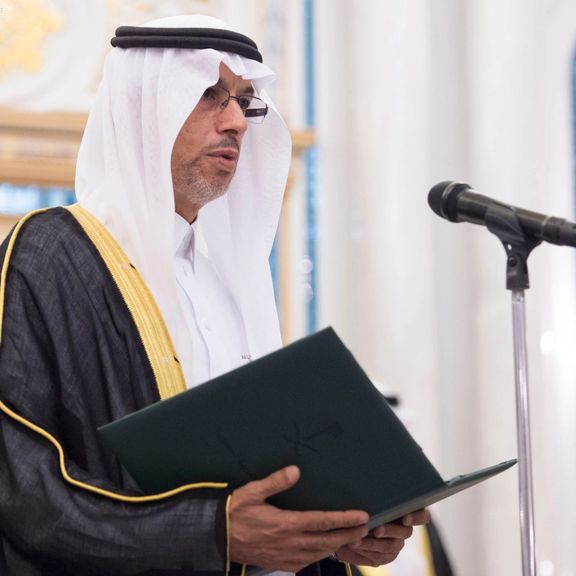
Saudi Arabia has reiterated worries over Iran’s lack of transparency with international nuclear inspectors, and its non-compliance with obligations under international nuclear agreements.

Saudi Arabia has reiterated worries over Iran’s lack of transparency with international nuclear inspectors, and its non-compliance with obligations under international nuclear agreements.
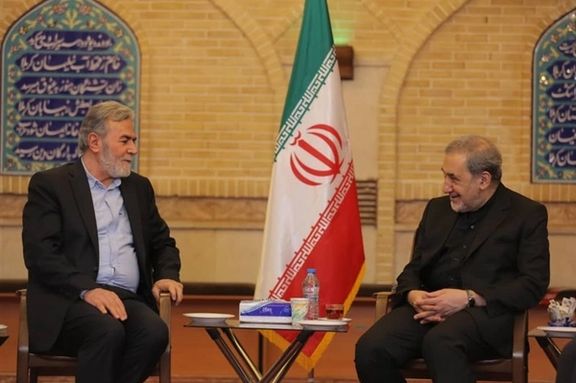
Iran’s Supreme Leader's adviser Ali Akbar Velayati has called for closer ties between Tehran and the Palestinian Islamic Jihad, designated a terrorist organization by the US, EU, and UK.
Velayati made the remarks during a meeting with the leader of the group Ziyad al-Nakhalah in Tehran on Tuesday, saying, “We have a close and serious relationship with the Islamic Jihad movement and the Palestinian resistance.”
The senior international affairs adviser of Ali Khamenei also highlighted the significance of visits by officials of neighboring states to Tehran.
Praising the support by the Islamic Republic and the growing power of the regional resistance front against Israel, Nakhalah said that today Israel has found itself encircled from all directions by the resistance axis.
He added that the enemies and the United States have adopted a “very weak” policy in the face of the Islamic Republic’s influence, claiming that Iran plays a very effective role in the region.
Earlier on Tuesday, Nakhala also held a meeting with the Iranian foreign minister, in which Hossein Amir-Abdollahian reaffirmed the Islamic Republic’s commitment to continue to support Palestinian groups against Israel.
Nakhala also met with Kamal Kharrazi, the head of Iran's Strategic Council on Foreign Relations, who also told the Palestinian official that Israel has been caught off guard and is besieged by the resistance front.
Israel and most regional Arab countries have been concerned over Iran’s support for militant groups and its interference in affairs of other countries.
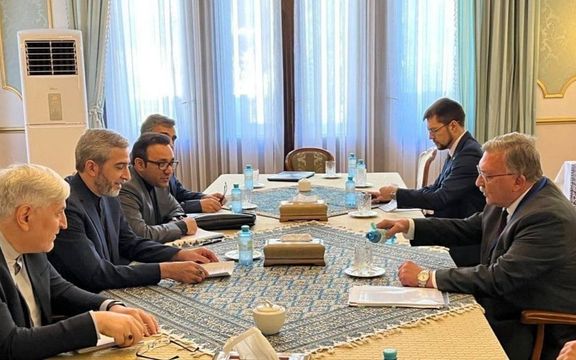
A round of meetings began Thursday in Vienna as various accounts emerged on what has or has not been agreed over restoring the 2015 Iran nuclear deal.
The official Iranian news agency IRNA was moved to cite “an informed source close to Iran’s negotiating team” denying a Wall Street Journal report that Tehran had dropped its demand that the United States remove Iran’s Revolutionary Guards (IRGC) from its list of ‘foreign terrorist organizations.’
The designation – made by President Donald Trump in 2019 – has been widely reported as a stumbling block in the talks, which began in April last year, but it is caught up in wider issues of Iran’s access to world trade as stipulated by the 2015 agreement, the JCPOA (Joint Comprehensive Plan of Action).
The Wall Street Journal’s formulation that Iran is “still calling for stronger guarantees that Washington won’t abandon the pact again or reimpose sanctions on Tehran” suggests Iran might swallow the FTO designation in return for other US concessions.
IRNA’s source said the onus lay with the US to “take advantage of the opportunity JCPOA participants have offered.” The US left the JCPOA in 2018 and will part in the Vienna talks indirectly, with Iran refusing to meet face-to-face.
Sword of Damocles
There have been wide reports that Iran is insisting on the International Atomic Energy Agency (IAEA) dropping enquiries into uranium traces found in sites used before 2003 and undisclosed to the agency as nuclear-related.
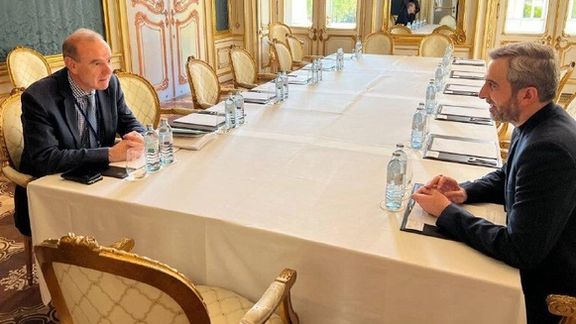
Mohammad Marandi, advisor-cum-spokesman to Iranian negotiators, tweeted Thursday that the IAEA could “no longer be used as the sword of Damocles.” Iran and the IAEA are at odds over explanations Iran has given over the pre-2003 work, with the agency’s dissatisfaction prompting France, Germany, the UK, and the US to successfully move a resolution at the agency’s governing board in June censuring Iran.
In Tehran, Mohammad Eslami, Iran’s nuclear chief, told IRNA that Iran had no reason to respect JCPOA nuclear limits, given the deal was “quasi-obsolete,” and that it expected an end to “false claims,” a reference to the pre-2003 work.
In his tweet Marandi highlighted Iran’s demand for guarantees that the US and Europeans respect Iran’s access to world markets as required under the JCPOA, suggesting they could not hope to both restore the 2015 deal and “keep a wrecking ball at hand…able to expand the sanctions regime at will.”
Which sanctions are ‘nuclear related,’ and which are not, has been a central theme of talks, both in Vienna, where the process paused in March, and in a bilateral US-Iran round in Qatar June mediated by the European Union.
Asl and Bagheri Kani active
Mohsen Naziri Asl, Iran’s recently appointed ambassador to the IAEA, emerged Thursday in Vienna as a leading participant, while Iran’s chief negotiator Ali Bagheri Kani met Enrique Mora, the EU chair of the talks, and the Russian IAEA ambassador Mikhail Ulyanov, who in past rounds of negotiations has been an enthusiastic tweeter.
Previous Vienna talks followed a format where remaining JCPOA signatories – China, France, Germany, Iran, Russia, and the United Kingdom – met formally under JCPOA auspices, with the US participating indirectly. There were also constant bilateral meetings of various parties - other than between Iran and US, as Iran refuses to meet US diplomats.
The resumption of talks in Vienna, surprising observers after a five-month gap, comes after EU foreign policy chief Josep Borell circulated in late July a written text outlining a possible path to agreement.
Washington confirmed Wednesday that Rob Malley, its chief negotiator and special Iran envoy, would be in Vienna. Malley tweeted that while he welcomed “a good faith attempt to reach a deal,” US “expectations are in check.”
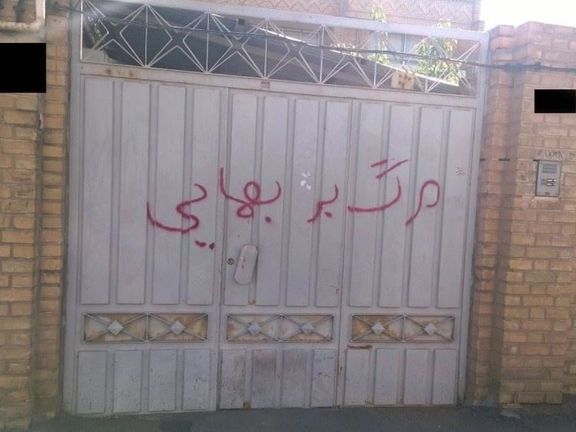
Amid Iran’s intensified persecution of followers of the Baha'i faith, the United States has called on the Islamic Republic to stop its ongoing oppression of the religious minority.
The US State Department’s Office of International Religious Freedom tweeted on Wednesday that “Amid a continued rise in arrests, sentences, and imprisonments, the US urges Iran to halt its ongoing oppression of the Baha'i community and honor its international obligations to respect the right of all Iranians to freedom of religion or belief.”
Earlier in the day, Democrat lawmaker Ted Deutch said he is “horrified that Iran arrested several members of the Baha'i faith, including religious leaders, on charges of spying for Israel without offering evidence of illegal activity.”
Noting that these “unjust detentions are part of Iran's state-sponsored persecution of religious minorities, including the Baha'i, Florida's representative urged “the House to swiftly pass my resolution, H.Res 744, which condemns Iran’s persecution of Baha’is and urges the President and Secretary of State to impose sanctions on Iranians directly responsible for serious human rights abuses, including abuses committed against Baha'is.”
Iran’s security forces this week arrested several members of the Baha’i religious community regarded by the clerical government as heretics, and raided more than 20 households.
Security forces also laid siege to a village in northern Iran on August 2 and started demolishing houses and farms belonging to members of the persecuted Baha’i faith.
Iran’s intelligence ministry claimed that the arrested Baha’is were linked to the Baha’i center in Israel, where the religious group’s international headquarters are located, and had collected and transferred information there.
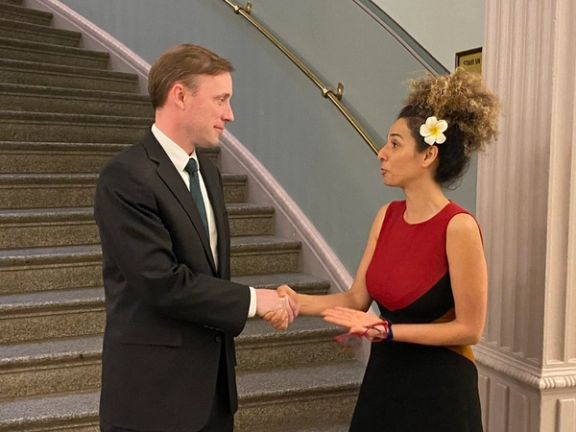
US National Security Advisor Jake Sullivan expressed concerns over the safety of Iranian women’s rights activist Masih Alinejad following the arrest of a man with an assault rifle outside her New York home.
According to a National Security Council statement on Wednesday, Sullivan, who spoke with the Iranian-American journalist, said that US President Joe Biden will continue to receive updates on her situation, and added that the administration will continue to protect its citizens and dissidents from threats from the Islamic Republic.
The statement added that “the US Government will use all tools at its disposal to disrupt and deter threats from Iran, including those which target US citizens and dissidents living in the United States."
A man armed with a loaded AK-47, identified as Khalid Mehdiyev, spent two days last week outside the home of Alinejad, and at one point attempted to open the door.
Alinejad, who was also the target of an international kidnapping plot orchestrated by Iran’s intelligence network last year, has promoted videos of women protesting Iran's compulsory Islamic dress code to her millions of social media followers.
Several former and current US officials have decried the Islamic Republic’s harassment of the New York-based journalist and praised her steadfast fight.
Senator Ben Cardin (D-Maryland) said on August 2, “We cannot sit idly by and continue to allow US persons to be victims of transnational repression. It's why we introduced the Masih Alinejad HUNT Act of 2021.”
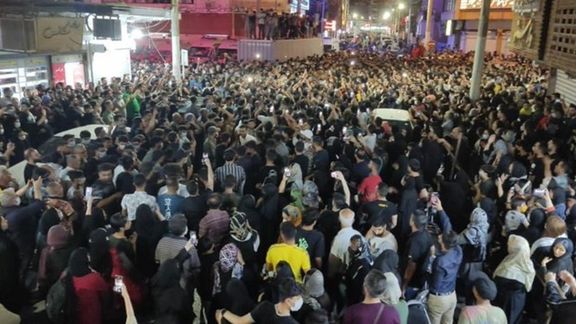
The international community must hold the authorities to account for the torrent of violence against protesters in Iran in May 2022, Amnesty International says.
In a new briefing entitled “They are shooting brazenly”: Iran’s militarized response to May 2022 protests released on Wednesday, the global rights watchdog reiterated the urgent need for the UN Human Rights Council to establish an independent investigative and accountability mechanism to hold Iranian authorities accountable for serious crimes under international law.
“The Iranian authorities’ unlawful use of force during the crackdown on the May 2022 protests reflects increasing militarization of the policing of protests in recent years, which has left hundreds of protesters and bystanders, including children, dead and thousands of others injured since December 2017,” Amnesty International said.
In May, southwestern parts of Iran witnessed two waves of protests. In the first half of May a government decision that resulted in a sudden rise of food prices led to largely peaceful demonstrations. Protesters chanted slogans against clerics including Supreme Leader Ali Khamenei and President Ebrahim Raisi as the overnight price hike was due to the government’s decision to remove subsidies for food imports.
Iran has systematically used military force against peaceful protesters on several occasions since 2017. In November 2019 security forces armed with military weapons killed at least 1,500 people.
Amnesty International reiterated that with avenues for justice completely closed domestically, there is urgent need for the UN Human Rights Council to establish an independent investigative and accountability mechanism to collect, consolidate, preserve, and analyze evidence of the most serious crimes under international law committed in Iran to enable future prosecutions.
The organization’s new research documents how Iran’s security forces unlawfully fired live ammunition and birdshot in May 2022 to crush largely peaceful protests over soaring food prices and a deadly building collapse.
The organization has verified that Iran’s security forces killed four people in connection with the protests and documented a pattern of birdshot injuries amounting to torture amongst protesters and bystanders, including children.
The next round of multiple anti-government protests took place in several cities in late May after the deadly collapse of a newly built ten-story building in the southwestern city of Abadan which according to the authorities left at least 43 people dead.
The incident instantly became an example of government corruption and insider dealings by Islamic Republic officials and led to days of large anti-government protests in Khuzestan and elsewhere.
The government deployed thousands of anti-riot police to Abadan and other cities in the province and arrested an unknown number of people, stopping the protests. Some officials later admitted that "corruption" was the underlying reason for the tragedy of the building’s collapse.
The authorities also shutdown the Internet and disrupted mobile networks in the affected areas to prevent people from communicating with each other and posting videos and photos of the violence against protesters on social media.
“Rightful outrage among people in Iran about state corruption, inflation, unemployment, low or unpaid wages, food insecurity, as well as political repression is likely to lead to more protests, and Iran’s security forces will continue to feel emboldened to kill and injure protesters if they are not held accountable,” Amnesty said Tuesday.
Speaking at NPT Review Conference in New York on Wednesday, Saudi Arabia’s new permanent representative to the UN Abdulaziz Al-Wasil warned of the repercussions of "Iran's nuclear practices" and Israel's non-accession to the Treaty on the Prohibition of Nuclear Weapons.
"Iran's lack of transparency with the IAEA violates the UN Charter," he said, adding that "transparency is necessary for the peaceful use of nuclear energy". "The danger of nuclear weapons spread threatens the Middle East and the world."
Noting that the Islamic Republic’s nuclear activities constitute a threat to the non-proliferation regime and to international peace and security, he expressed his country’s “deep concerns” over Iran’s nuclear program.
Citing the recent International Atomic Energy Report which cast doubt on the supposed peaceful nature of Tehran’s plans, he added, “The Kingdom of Saudi Arabia supports all international efforts to prevent Iran from possessing nuclear weapons.”
In a ministerial statement released for the Tenth NPT Review Conference on Monday, August 1, the United States, France, and the United Kingdom also reiterated their position that the Islamic Republic should never achieve the capability to build nuclear weapons, saying that said the Nuclear Non-Proliferation Treaty has reduced the risk of a devastating nuclear war, and further reduction of that risk must be a priority for all NPT states parties.
Late in July, Iraqi Foreign Minister Fuad Hussein announced that Saudi Arabia and Iran have agreed to hold in Baghdad following rounds of closed reconciliation meetings.